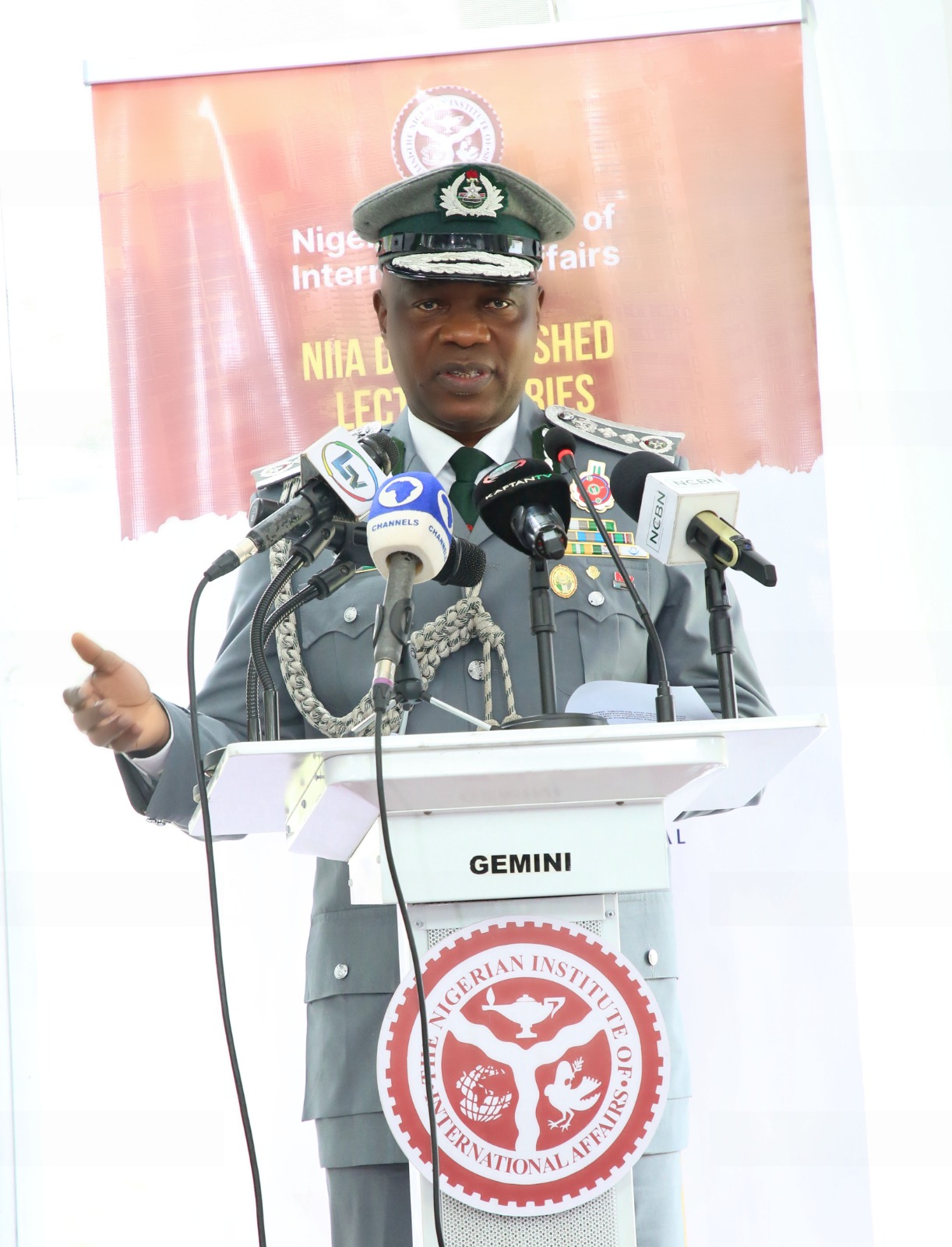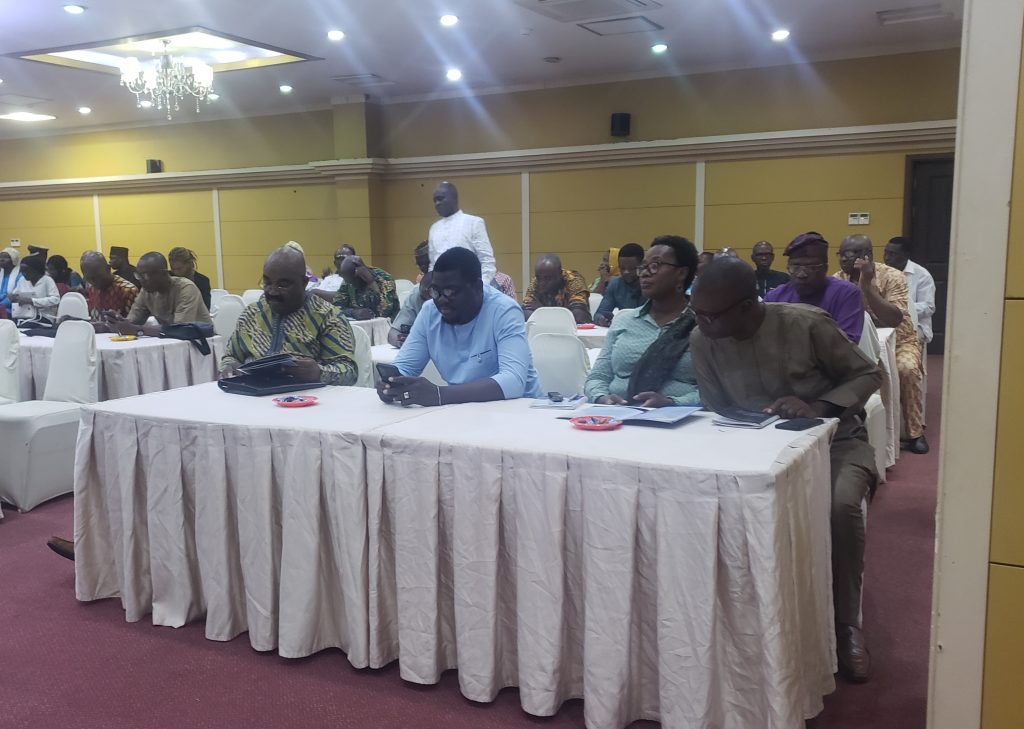Customs Report
‘New Customs Act Don’t Discriminate In Penalty For Infractions’ Adeniyi

BY EGUONO ODJEGBA

Dignitaries and Officers at the event, including Prince Olayiwola Shittu, Chsrles Okorofe P.hD and Compt. Nnadi and Compt Oramalugo
The leadership of the Nigeria Customs Service (NCS) yesterday declared that contrary to public concerns that the Customs 2023 Act may have failed to incorporate relevant clauses designed to sanction errant personnel involved in trade infractions, the new act and indeed even the old Customs And Excise Management Act (CEMA) did not overlook such fundamental issue.

A cross section of LOME members, L-R, Francis Ngwoke, Publicity Sec, Mr. Okey lbeke, Chief Timothy Okorocha, President, Friday Odemena, Finacial Sec, and Otunba Oni, former president
In the same vein, the NCS shed light on the reviewed sanctions on penalties for default payment in custom duty, noting that beyond the former recovery system in CEMA where debit note (DN) is issued in lieu on duty under payment, that the Customs 2023 Act imposes a further 25percent penalty fine that is ceiling and unalterable; with a further prospect of a six months jail term for any importer of freight forwarder and or clearing agent as the case may be; in the event of failure to be able to prove that the infractions were not deliberate.
The Comptroller General of Customs (CGC), Bashir Adewale Adeniyi MFR who was fielding questions from maritime journalists after his presentation of the ‘Customs Act 2023 And Blue Economy’ at the League of Maritime Editors (LOME) Annual Retreat/ 25th Anniversary held at the Lagos Travels Inn, explained that there are codified procedures for sanctioning of its officers, without necessarily making it a public issue.

Coss section of participants including veteran customs report broadcaster, Jacob Idinye, Dapo Olawumi, Publisher of Daily Trend, Hope afoke P.hD and Funsho Olojo, Publishe of the populat The Eye Witness online magazine
The CGC who was represented by the Customs Area Controller, Tin Can Island Command, Comptroller Dera Nnadi mni, stated that such procedures are sacrosanct and not subject to public sentiments, and assured that the NCS abhors indiscipline and violations of the extant rules amongst its personnel.
Asked if officers why the new Customs 2023b Act was silent on penalty for officers who collude with freight forwarders in terms of violation of customs trade, the CGC debunked such assertion and or worry as a misconception.
“So we have procedures for punishing officers that have committed infractions alongside freight forwarders. We have the custom legal notice which I mentioned here. We have the Custom code which defines the conduct of custom officers. We have the public service rule which defines how a custom officer who is a civil servant is to be punished.”
Exuding utmost sincerity and confidence, the representative of the CGC broke down the issue in such a manner that no one was left in doubt; noting that the customs service has no reason to shield its officers linked to acts of infraction through collusion with third parties.

He explained that acts of criminal commission in circumventing customs trade laws is and has always been personal and should not by any stretch of the imagination be seen as a corporate action; since the individual officer and the service are distinct.
“The likelihood of collaboration of such crimes being committed alongside custom officers is an age old talk that it takes two to tango. We are regulators, it is possible that people may connive, I’ve always said it, we don’t hide it, that you cannot legislate people’s character. There’s no law that says that you are legislating somebody’s personal integrity. But there are laws and provisions for regulating the conduct of custom officers.
“There’s no particular law to regulate my personal character as Nnadi. So if I choose to stay outside that law as Nnadi and commit crime, my criminal conduct shouldn’t be used to adjudge the entire Nigerian Custom Service. The freight forwarding community and most of our stakeholders have men of very high level of integrity.
“In Tin Can Island Port for instance, they have been collaborating with me, helping me to generate revenue. If there are one or two people that are flying out of the wheel to commit crime, we don’t use them as yardstick to measure the entire freight forwarding community or clearing agents. The same way you cannot use the conduct of one customer officer to adjudge the character and conduct of the entire service.”
Explain further, Nnadi disclosed that errant officers have continually faced the full wrath of the law and have never been granted a soft landing to suggest that only their civilian collaborators are brought to book.
“Do we punish the custom officers when there are such infractions committed and it is observed that those officers are involved? I wish Comptroller Ejibunu is here, he would have been in a better position to answer that question because he has a list of officers that he invites to his office. I also have my DC enforcement here, there are officers sent to his offices when there are infractions that have been committed. “Perhaps because we don’t publish the names of such officers on daily basis, you may not know, but if you should pick any of the copies of our newsletter you will see regularly, names of officers. I am sure even among you, you would have made friends with some officers who were dismissed from the service. You would have made friends with some who have been reduced in rank.
“There are even some that have been prosecuted. I’m sure some of you are aware that the containers of arms that was seized in Apapa some time ago, that some of the officers that were involved in that were being prosecuted alongside the declaring agent and the importer.”
Speaking on the enhanced penalty for customs trade infractions which has said has been upgraded to consist of jail term; he said the Customs 2023 Act has made it extremely risky for infractions to be business as usual.
“There is an increase in the penalty under the new Customs Act. Like I said in the past, if there’s an infraction and the debit note is supposed to be raised for you…debit note is recovery of shortage in payment made by the declareant. After asking you to pay what you did not declare, we charged you flat rate in the past, flat rate of N600, that was too small. And that was because when that law was made in 1955, cargo throughput in Nigeria was so small and the value of money was so high.
“So over the years, nobody amended that law until recently when Customs got approval to increase it to 25% of value of the duty that you have to pay. However, under the new Custom Act, it has been further enhanced to include the fact that you will pay 25% penalty. You will pay the short changed value, where you are supposed to pay N10,000 and you paid N4000, you will pay the N6000 and you will pay the 25% of the 10,000 which you are supposed to have paid. This time around, you will now pay another penalty of N2million flat rate, and then you also risk going to jail for six months.
“So it does not matter now, if you shot paid N200, your punishment is you’ll pay 25% of the original money and another N2million. Imagine N2million naira for short paying N200, and you also risk going to jail if you cannot prove that that shortage in payment was not deliberate.”





































